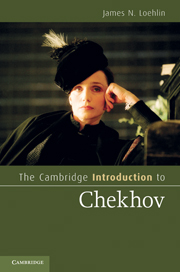Book contents
A note on translations and transliteration
Published online by Cambridge University Press: 05 June 2012
Summary
Unless otherwise specified, all quotations from Chekhov's dramatic works are from Laurence Senelick, Anton Chekhov: The Complete Plays. For the stories, I have used the translations of Richard Pevear and Larissa Volokhonsky when available, otherwise, the Constance Garnett translations in the thirteen-volume Ecco edition. Citations from individual works are given in a note on first mention to clarify which translation is being used. For longer works, page references for all subsequent citations are given in the text. For shorter works and where acts are discussed individually, I have opted instead to give a page range in a note at first mention rather than cluttering the text with page references. For Chekhov's letters, I have used Rosamund Bartlett's Anton Chekhov: A Life in Letters where possible, giving the date in the body of the text.
In transliterating Cyrillic, I have tried to be consistent without being pedantic. Anglicized name forms are used for tsars (thus ‘Alexander II’, ‘Nicholas I’) and common Russian place names (e.g. St. Petersburg, Yalta), and I have used the established Western spellings of well-known figures (e.g. Fyodor Dostoevsky, Maxim Gorky, LeoTolstoy), even though this may lead to inconsistencies. For the most part, I have reproduced character names as they are transliterated in the translations I am using, although I have tried to avoid too many confusing variants. I have standardized the transliteration “Chekhov” in quotations. The soft sign is not denoted with Russian words in the text (e.g. glasnost).
- Type
- Chapter
- Information
- The Cambridge Introduction to Chekhov , pp. xiii - xivPublisher: Cambridge University PressPrint publication year: 2010



